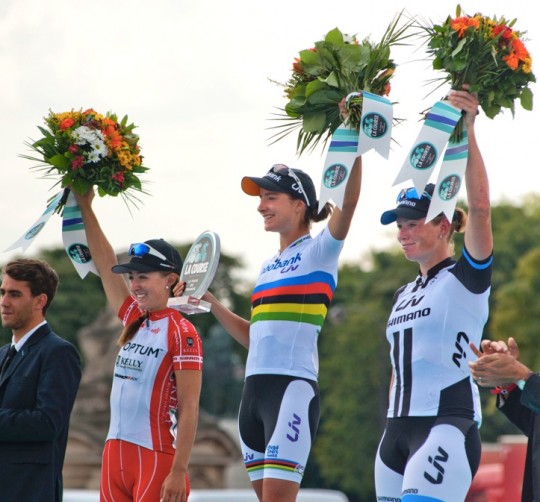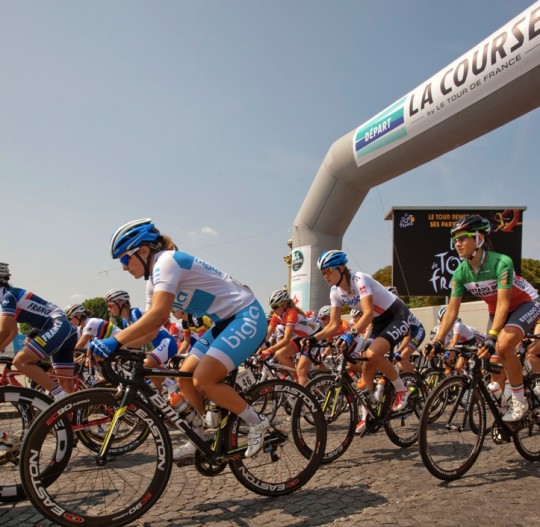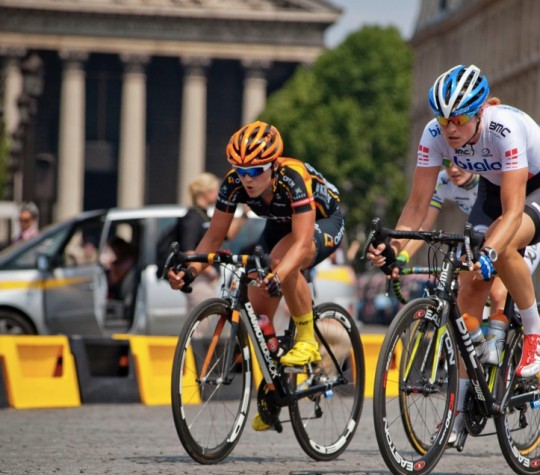— We’re excited to share a report from a major bike race in Paris — and we’re not talking about the Tour de France. Author and former Portland resident Anna Brones witnessed the first ever “La Course,” a women’s race put on by the organizers of the Tour, and she filed this report for BikePortland. (Photos by Luc Revel)
Three women stood on a podium on Sunday and it wasn’t to give flowers. It was to receive them.
When I was in middle school I wrote a list of life goals. Number 34 was “go to France and watch the Tour de France.” I already loved cycling and I loved watching the Tour de France on television with my father. For me the Tour embodied something that was about more than just cycling. As a matter of fact, I didn’t always know the names of riders, and I certainly didn’t entirely comprehend the ins and outs of bike racing, but what I did know is that cycling made me happy, and watching the Tour felt like taking part in something big, even if from afar.
Sunday I took part in something even bigger – something I never could have dreamed when I wrote my life goal list so many years ago. On Sunday, I stood on the Champs-Elysées to watch women ride their own race, a 91-kilometer route through Paris, at the inaugural La Course by Le Tour.
Advertisement
It was only a little over a century ago that cycling was still taboo for women. In 1891 a writer wrote, “I think the most vicious thing I ever saw in all my life is a woman on a bicycle.” The bicycle ended up being a vehicle for emancipation in the early 19th century, memorialized by Susan B. Anthony’s famous quote: “Let me tell you what I think of bicycling. I think it has done more to emancipate women than anything else in the world. It gives women a feeling of freedom and self-reliance. I stand and rejoice every time I see a woman ride by on a wheel…the picture of free, untrammeled womanhood.”
“I think it means even more for the women watching than the women racing.”
— Emma Pooley
These days of course, women are welcome to ride, but in the cycling industry, much like in other industries, a gender discrepancy is still very much present, and it’s there outside of the cycling industry too. In the U.S. for example, 24% of all bicycle trips are made by women and 76% are made by men.
Dealing with such a gender gap is no easy task, but you have to start somewhere, and what better way than with the most iconic bicycle race in the world?
Last year riders Marianne Vos, Emma Pooley, Kathryn Bertine and Chrissie Wellington launched a campaign called Le Tour Entier. The goal was “to help support the growth of women’s cycling and build a sport with greater consumer, media and commercial appeal – starting with a women’s race at the Tour de France.”
I signed that petition. So did over 97,000 other people. The result was Sunday’s La Course by Le Tour, a momentous event that will go down in not only cycling history, but women’s history as well.
“Historically there has been a discrepancy in enabling women to realize their potential,” said Wellington before the race kicked off. La Course was the opportunity to begin to change that. “Women’s cycling is simply cycling,” said Wellington. “Women’s cycling is exciting not because they’re women but because they’re aggressive, passionate.”
That aggressiveness and passion showed on every single lap as the women looped up and down the Champs-Elysées, speeding past some of Paris’ most iconic buildings and monuments. They were fast. They rode hard. It was a wonder to watch.
To run the race on the same day as the final stage of the Tour de France ensured an incredible amount of media coverage, ensuring exposure of a women’s bike race like never before. “This has the biggest audience of a women’s race ever probably,” said Pooley. “I hope lots and lots of women around the world see it and are inspired by it.”
That’s the ultimate takeaway from Sunday’s race. While the chance to ride on the Champs-Elysées is every cyclist’s dream, the end impact isn’t just for the racers. “I think it means even more for the women watching than the women racing,” said Pooley.
Wellington agreed, emphasizing that this was certainly more than just a race. “This is just the beginning, races like this will grow and develop, and at the grassroots [level] more women will get on bikes,” she said. “Hopefully little girls are watching this that grow up and think that they too can ride a bike, ride it professionally, if they want to, no matter where they live, whether they’re in France, or Britain or Afghanistan.”
Three women stood on a podium on Sunday and it wasn’t to give flowers. It was to receive them. La Course champion Vos, and all the rest of her racemates can be proud not only of the fact that they rode on the Champs-Elysées, but that they’re building a movement that goes beyond the race course.
So let us all ride, whether it’s for a race, or just for fun. And let’s make sure that we encourage others to ride too, in the process, building something bigger and better that everyone can take part in.
— by Anna Brones





